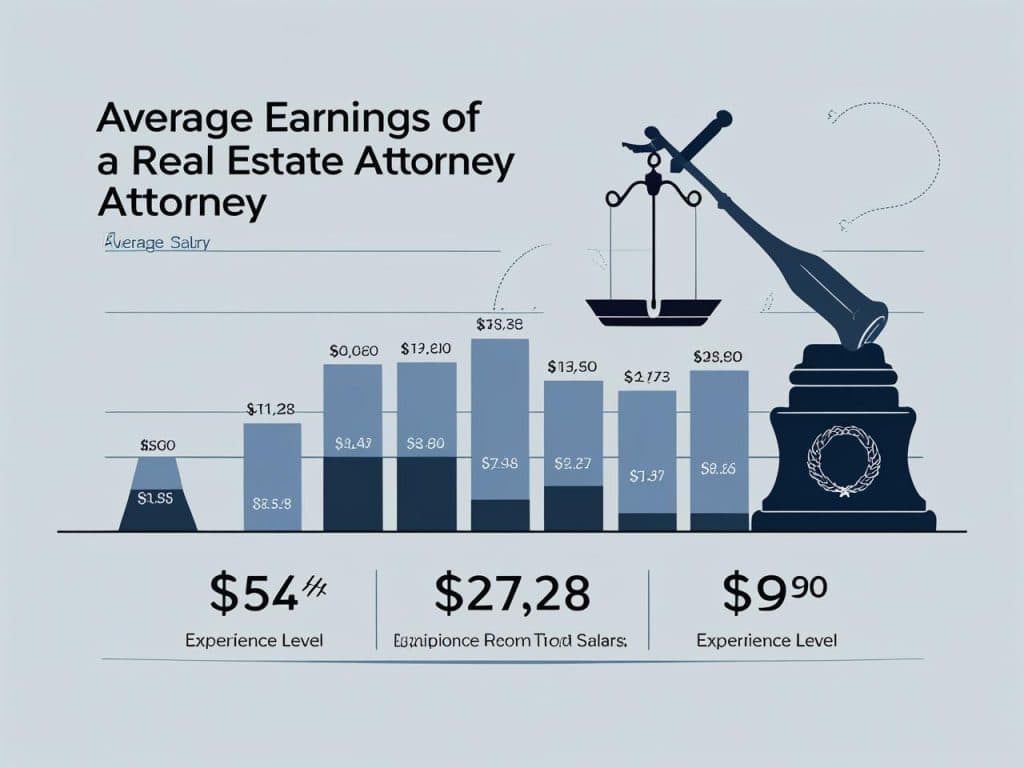Real estate law is a unique legal field centered around property—buying, selling, leasing, and financing. So, how much does a real estate attorney make? These legal professionals guide clients through transactions, offering critical legal advice and representation.
They ensure legal requirements are met and help clients steer through a landscape filled with contracts, disclosures, and title reviews. Real estate attorneys draft and analyze agreements, conduct title searches, and resolve disputes when needed. Their work leans heavily on laws like the Real Property Law, Uniform Commercial Code (UCC Article 9), and local zoning rules.
They must also stay fluent in federal laws such as the Fair Housing Act (42 U.S.C. §§ 3601–3619) and the Truth in Lending Act (15 U.S.C. §§ 1601–1667f). Each deal must comply with these, or risk costly litigation.
Collaboration is key. These attorneys work with realtors, banks, and buyers alike. For example, Sears v. Levy, 158 A.D.2d 125 (N.Y. App. Div. 1990), shows how a lawyer’s involvement can prevent fraudulent transfers. Even in broader due process cases like Watts v. Dulles, 308 F.2d 622 (D.C. Cir. 1962), the principle of fair procedure underscores legal practice.
In land disputes, cases such as Howard v. Kunto, 477 P.2d 210 (Wash. Ct. App. 1970), guide attorneys on adverse possession rules. In short, this field demands sharp skills and constant legal updates.
Key Takeaways
- Real estate law is a specialized and profitable legal field.
- Attorneys need a J.D. and state bar admission to practice.
- Experience, location, and firm size all influence earnings.
- Salaries can span from $70,000 to over $250,000.
- Perks include autonomy, high income, and growth potential.
What Factors Affect a Real Estate Attorney’s Salary?
Multiple factors affect how much a real estate attorney makes. Location often has the biggest impact. Attorneys in metro areas usually earn more due to a higher cost of living and client demand.
Lawyers in states with detailed disclosure requirements or tenant protection laws, such as California Civil Code § 1102, may face more complex cases—thus commanding higher fees. The nature of local real estate markets often shapes income brackets.
Firm size also matters. Large firms tend to pay better due to the complexity of their transactions. Smaller firms might offer flexibility, but often with lower pay. Experience is another major factor. The more you have, the higher your value.
What Education and Experience Are Needed?
Becoming a real estate attorney starts with earning a Juris Doctor degree. Admission to law school usually depends on GPA, LSAT scores, and a strong application. After graduation, passing the state bar exam is mandatory.
The ABA Model Rules of Professional Conduct, Rule 1.1, requires attorneys to demonstrate competence. Internships during law school—especially with municipal planning departments or title companies—help develop that competence. These law school internships often cover zoning, development law, and transactional work.
An LL.M. in real estate law isn’t required, but it helps build deeper expertise. As with most professions, your income often mirrors your training and background.

What’s the Typical Salary Range?
New attorneys (0–2 years) typically earn between $70,000 and $120,000. With 2–5 years, that can rise to $180,000. By 5–10 years in, many reach up to $250,000. Attorneys with over a decade of experience—especially in major cities or high-volume firms—can command $400,000 or more.
However, recent national salary data provides a clearer picture. As of July 2025, Salary.com reports that the average annual salary for real estate attorneys is $157,903, with most earning between $137,827 and $174,718. ZipRecruiter puts the average slightly lower at $140,845, but notes top earners make up to $228,500 per year. In certain cities like San Francisco, salaries can average $291,152, ranging from $178,000 to nearly $470,000, depending on firm size and expertise.
The Bureau of Labor Statistics (BLS) also updated its data in May 2024, showing the median salary for all attorneys is now $151,160, up from the older 2020 figure of $126,930. This broader number includes all practice areas, but real estate attorneys often surpass it based on location and sector demand.
Does Geography Matter?
Absolutely. Attorneys in places like New York or San Francisco earn significantly more than those in rural counties. The demand for legal services and regional regulations influence salary scales.
For instance, in New York, attorneys often deal with rent stabilization rules, complex co-op transactions, and multifamily property litigation. In California, practitioners must navigate the California Environmental Quality Act (CEQA) when advising on land use projects. Such regulations add legal complexity—translating to higher fees and greater earning potential.
In cities with booming real estate sectors, attorneys may see more high-value transactions and litigation—factors that boost pay. But in smaller markets, while the pace may be gentler, compensation often reflects local economic conditions.
How Does Firm Size Affect Pay?
Attorneys at large national or global firms generally earn more. These firms handle intricate deals, often involving commercial real estate or international investors. With higher stakes come higher salaries and bonus structures tied to billable hours and deal volume.
Large firms also provide institutional resources—dedicated title abstractors, zoning consultants, and litigation support—that smaller firms might lack. This infrastructure enhances both attorney productivity and case profitability.
Smaller firms or solo practices may offer independence but fewer financial rewards. Yet, for attorneys seeking work-life balance or niche markets, smaller firms can be a good fit. In such settings, attorneys often develop personal client relationships and may charge flat-fee rates rather than hourly billing.
Does Experience Equal More Money?
Experience pays. Early-career attorneys may need to prove themselves, but over time, client trust and legal acumen grow. However, salaries may plateau after a certain point.
For instance, someone with five years of experience might double their starting salary. But past ten years, increases often depend on business generation and firm leadership roles.
How Do Real Estate Lawyers Compare to Others?
Compared to peers in family law or public defense, real estate attorneys generally earn more. They deal with high-value property rights, title transfers, and regulatory compliance—often translating into steadier and more lucrative workloads.
That said, corporate lawyers or intellectual property attorneys may still outpace them in raw earnings. But what real estate law lacks in flash, it makes up for in grounded, asset-backed practice. Unlike speculative litigation or IP enforcement, property law deals with tangible stakes—your client’s land, building, or home.
Real estate law strikes a middle ground—lucrative, intellectually engaging, and practical. It rewards attention to detail, dealmaking finesse, and long-term client relationships over courtroom theatrics.
What Are the Perks of This Career?
- Independence in client choice and scheduling
- High income potential, particularly for attorneys in urban markets or with niche expertise
- Fast-track promotion in firm settings, especially for rainmakers with strong referral networks
- Exposure to diverse legal issues—from easement disputes to zoning approvals—keeps the work intellectually varied and rarely dull
Attorneys may also offer free-of-charge property law advice during community seminars or pro bono initiatives, building trust and networks while serving the public interest. These moments underscore why this career often brings personal satisfaction alongside professional gain.
Is the Job Market Stable?
Yes, with caveats. Real estate law moves with the economy. When interest rates drop or markets boom, demand surges. When markets slump, litigation may replace transactional work.
Federal legislation like the Dodd-Frank Act (12 U.S.C. § 5301) affects lending disclosure requirements, impacting attorney workflows. Landmark decisions, including Kelo v. City of New London, 545 U.S. 469 (2005), have spurred local governments to reevaluate eminent domain policies—thereby increasing demand for legal consultation.
Additionally, recent housing shortages and zoning reforms, especially in fast-growing states like Texas and Florida, signal continued need for lawyers who understand housing codes and land use law. Attorneys must adapt.
Still, skilled lawyers are always needed—for compliance, advocacy, or closing deals.
Conclusion
In sum, a career in real estate law offers strong financial rewards and professional satisfaction. It’s not just about how much a real estate attorney makes—it’s about how well one masters statutes, client service, and negotiation.
Your location, experience, and chosen work environment shape your trajectory, but so does your ability to work across disciplines. This field blends legal intellect with business acumen, demanding rigor and flexibility in equal measure.
If you’re drawn to a mix of contracts, client work, and high-stakes decisions—whether on the courthouse steps or at a closing table—real estate law might be your calling.
Additional FAQs
What are the typical costs for hiring a real estate attorney?
Attorney fees vary widely. In straightforward transactions, real estate lawyers might charge a flat fee between $500 and $1,500. For litigation or complex development matters, hourly rates may range from $200 to $600 per hour, depending on region and experience.
What are the benefits of becoming a real estate attorney?
Real estate attorneys enjoy a strong work-life balance, particularly in transactional roles. Other estate attorney benefits include client independence, consistent demand, and the ability to specialize in high-value commercial or residential portfolios.
FAQs
What is a real estate attorney?
A legal professional who handles property-related matters such as transactions, disputes, and zoning laws.
What does a real estate attorney do?
They assist clients with buying or selling property, title review, contract drafting, and dispute resolution.
How much does a real estate attorney make?
Salaries range from $70,000 to over $250,000, depending on experience, location, and firm type.
What training is needed?
A J.D. from law school, passing the state bar exam, and ideally law school internships in real estate or zoning law.
What skills are essential?
Legal analysis, contract negotiation, communication, and deep knowledge of property law statutes and local ordinances.
















